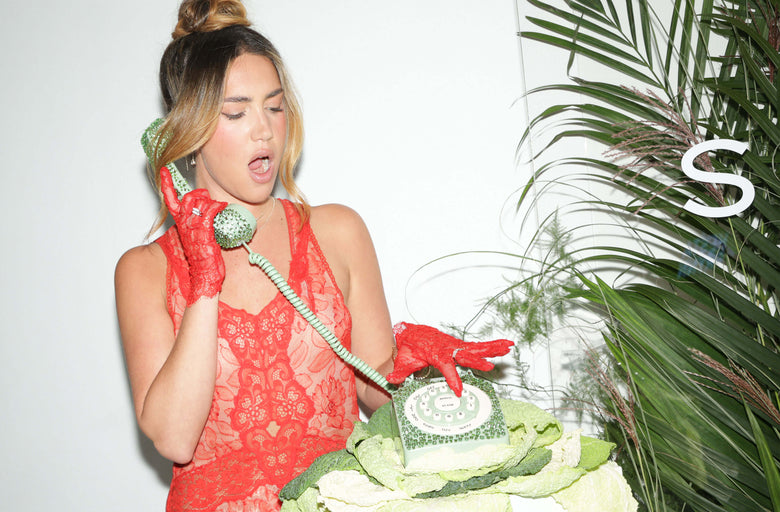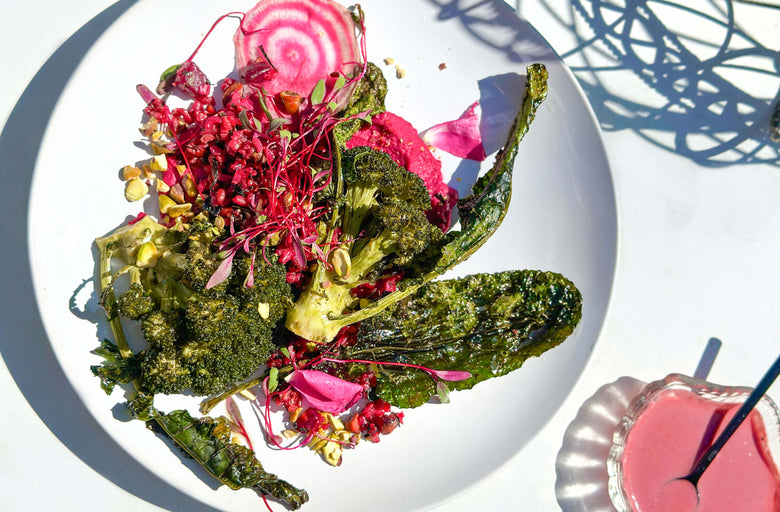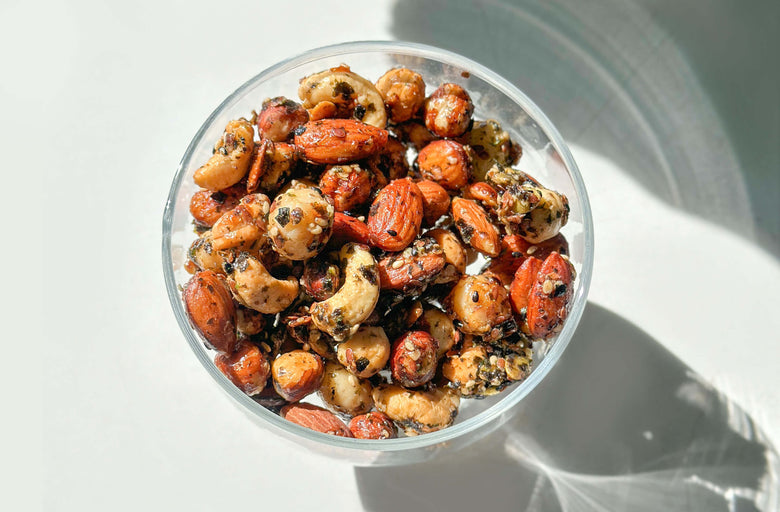When I set out to freeze my eggs this winter, I wasn’t afraid of the retrieval not working, despite a low AMH reading from my doctor indicating that exact possibility. I’d formed a clear plan, involving acupuncture, fertility-centric nutrition, and supplements to boost my AMH and general fertility, and after three months of following it to a T, felt confident my body would respond to the process. And this desired response was precisely what scared me.
Why? Mainly because the Internet is teeming with egg freezing horror stories. It’s almost impossible to find anyone writing or posting about their experience in a way that’s even neutral. Crying jags, wild bloating, persistent weight gain, extreme irritability, cramping, and unshakeable sadness for three weeks plus, seem to be the norm for egg freezers online. The medications you inject yourself with are hormones, which have an outsize impact on almost every facet of the female body, and the fact of unpleasant symptoms is, unfortunately, proof positive of their efficacy.
Fear of these symptoms almost kept me from freezing my eggs, and made the process far more stressful than it had to be. Numerous friends have indicated they feel similarly apprehensive about what the process might do to their bodies and minds. So it was much to my surprise that my retrieval and the two weeks leading up to it were almost pleasant. Sure, there were nerves, and it was disruptive to go to the doctor every morning for monitoring. But with some foresight and careful planning, I managed to make the two weeks egg freezing was my primary occupation exciting rather than awful. Everyone’s body is different, and luck almost certainly played a role in my smooth experience. But the following steps helped set me up for that as much as possible. I relay them in the hopes of convincing some fence-sitters not to let the fears I had keep them from egg freezing, which is one of the best investments I’ve ever made.
Here's how to freeze your eggs without losing your mind:
SET UP SUPPORT IN ADVANCE
A critical component of my sanity preservation was never doing my injections alone. Every night at 6:30—you have to give yourself shots at the same time every night—a different person I love would come over to my apartment. We’d pour ourselves a mocktail from Seedlip or Kin, raise a glass to fertility, and get our mad chemist on, pulling Gonal-F pens, Menopur vials, mixing needles, and syringes out of the fridge to stick into my abdomen. (If there is anything in the world that can bring you closer to someone, I don’t know what it is.)
Give yourself whatever you need to get through the cycle, but don’t think that necessarily has to be you or will be you in a dark emotive cave. I only had one day of feeling particularly sad, and a friend came over for injections and then took me to dinner, which was exactly what I needed. Think about what you want more of in life, and engineer your cycle around that desire to the fullest extent possible. You may be craving time alone, in which case, take it. Give yourself permission to take what you want more of, and don’t let horror stories of hormonal breakdowns on the Internet—reminder: people typically take to the Internet when things aren’t going well—dissuade you from company, or at least trying to live as close to a normal life as possible, if that’s what you want.
And, for the first two nights of injections, I had a nurse come and help me get the hang of it. Many nurses across the country offer in-home IVF injection services (which are the same as egg freezing injections). I was very glad to have them - and videos I took of them prepping the meds - to help me get the hang of it before injecting myself without them. Your doctor will likely direct you to FreedomMedTeach, which has detailed videos for injections. But the bundle of medications you receive come with a frankly overwhelming array of needles, syringes, swabs, mixing caps, and caveats, and your dosage may impact whether you need to deviate from what’s taught in the video, and titrate two or more vials into one medication. Nurses can walk you through your own specific instructions.
With foresight and careful planning, I managed to make my two weeks of egg freezing exciting rather than awful.
EXERCISE
I’d heard you aren’t meant to exercise while freezing your eggs, or for the week following your retrieval, clocking the total time you may be out of commission up to three weeks. As someone who typically works out five to six days a week—and credits such movement with a significant portion of her sanity—the workout ban freaked me out. When I talked to my doctor about my fear of sitting still for three weeks, she said light movement was fine, but it turns out she really meant light. Not only was HIIT out of the question (fine by me) but so was Pilates, any cardio involving jumping, and ultimately, anything but very gentle prenatal yoga, with no twists. The reason? Hormone medications stimulate your ovaries to grow multiple eggs, rather than the one per month you typically grow. While eggs are typically 3/4”, eggs stimulated with hormones can grow two to three inches in size, each. All this means you’re at risk for a serious condition called ovarian torsion, where the ovary twists around its ligaments, cutting off blood supply. More strenuous workouts can increase your chances of ovarian torsion.
Got it. I prepped to make walking my workout by ordering a light set of Bala bangles to strap around my ankles in order to intensify my walks without landing myself in the hospital, and also by familiarizing myself with how to use an elliptical machine, which had always looked like a parody of a workout to me. I also resolved to walk to all of my daily monitoring appointments, and anywhere else I was going during the cycle.
Think about what you want more of in life, and engineer your cycle around that desire to the fullest extent possible.
Much to my surprise, I liked my three weeks of moderation. On days when I walked to and from both my appointment and office, I clocked a little over two hours of walking a day. My cycle lasted thirteen days, and during that time I took five trips down to the gym to use the elliptical, which gave my nervous energy an outlet it otherwise wouldn’t have had. I cite specific numbers because it’s the exact kind of information I would have killed for during my cycle, as words like "moderate," and "scaled-back" are wholly relative.
When I stepped back on my yoga mat a week after my retrieval, it was like I’d never left. If you are an active person and have been for some time, taking three light weeks isn’t going to set you back. I was more afraid it would than I’d like to admit, but that fear turned out to be a whole lot of nothing.
[images: 1- me the first day of having a little bit of a pseudo-pregnant stomach; 2-the view from the doctor’s office I went to every other day; 3- the Tarot card I pulled the morning of my retrieval (the Empress is the fertile mother card!); 4- the alarms I set on my phone every day as medication reminders; 5- my post-retrieval, post-Shen facial glow.]
ACUPUNCTURE
For the three months before my cycle, I’d been going to acupuncture several times a month, seeing fertility guru Aimee Raupp in the city, and Yinova Center in Brooklyn. Acupuncture is one of the best fertility treatments around, and is also excellent at regulating hormones. Therefore, acupuncturists recommend that women bump their treatments up to twice a week during their egg freezing cycle. “The medications given during an egg freezing cycle are the same as during an IVF cycle,” Yinova founder Jill Blakeway told me. “There is considerable research that shows that acupuncture can enhance its efficacy by creating the ideal conditions for healthy egg development, maintaining the delicate balance of hormones, and increasing ovarian blood flow. Consequently, we give the patients acupuncture twice a week while they are taking ovarian stimulating drugs.
Knowing I had acupuncture scheduled to address any side effects that did come up was a real comfort as I went into my cycle. The only physical symptoms I had were mild headaches, cramping, and nausea, which one session on Raupp’s acupuncture table was enough to clear up. Having acupuncturists who knew me, my body, and my concerns by the time my cycle started was another comfort.
MEDICATION
Prep as best you can for any side effects that are common with hormone injections. These include cramps, nausea, and headaches. I had all three off and on throughout the cycle, but they weren’t anything that Tylenol and anti-nausea medication couldn’t handle. Due, again, to lack of widely available information, I was afraid to take any medication lest it interact with the hormones negatively or blunt their effectiveness at growing eggs. But my doctor was firm that I could absolutely take Tylenol and anti-nausea meds, along with a regular low-dosage sleeping medication I’ve been on for years. Raupp also recommends people have hot water bottles on-hand for cramps that might crop up, both during the injections cycle and after the retrieval.
People report feeling slugging, bloated, and broken out after the retrieval, which did not sound like my ideal way to celebrate being done. I called period expert Monica Yates, who friends recommended I speak with to talk about getting off the hormonal roller coaster. “You need to flush the excess estrogen out,” Yates told me. “You can do this by eating Brassicas veggies, taking DIM supplements, and the Alpha-Venus supplement.” I stocked up as instructed, and am pleased to report I was back to normal three days after my retrieval, although your mileage may obviously vary.
DIET
I’d spent the three months before my retrieval eating a diet geared towards fertility at Raupp’s instruction, full of healthy fats like avocado, hormone-free organic meat, and plenty of bone broth and cooked vegetables. Beyond abstaining from alcohol or any late nights out, I decided to eat whatever I wanted during my two weeks of injections, which turned out to be a mixture of the same fertility foods and a steady rotation of cheeseburgers and truffle fries at various post-injection restaurants.
After spending so much time calibrating my every meal towards fertility alone, I set myself up with ten days of Sakara, which turned out to be exactly what my body wanted after the retrieval. I was eating just for myself again, and felt clear-eyed, well-rested, and full of energy each week. In short, I felt good - the opposite of the way I’d been afraid a cycle would leave me feeling.
I got my fill of Yates’ recommended cruciferous veggies with Sakara’s filling salads, which felt like just the right off-ramp from two weeks of ad hoc eating and hormone injections. I felt light and energized, and hardly experienced any post-retrieval side effects, particularly of estrogen dominance. I’d been worried about the physical side effects of the retrieval, and wanted to invest in Sakara meals to make sure my side of the nutritional street was clean. And while Sakara’s clean, fresh, nutritionally-optimized meals absolutely got me there, the fact that they included dishes like eggplant “parmesan," burgers with vegetable fries, and cherry tea cake for breakfast made my post-retrieval detox a real pleasure rather than an obligation—much, in fact, like the egg freezing process itself turned out to be.
“What this really comes down to is engaging in acts of self-care to mitigate what can be an extremely difficult and stressful period,” Dr. Jaclyn Tolentino of New York’s Parsley Health told me. “We’re looking to support the body and the mind with our actions, which may include eating a nourishing, balanced whole-food diet, choosing the right type of movement for our state of health and our needs, and selecting mind-body modalities like acupuncture and meditation that promote balance, internal wellness, and relaxation.”
And finally, make a little time to treat yourself after the process is over. I booked a post-retrieval facial at Shen Beauty in Brooklyn, and left my three weeks of egg freezing feeling glowy and vital. There’s a limited amount any woman can control in terms of how her cycle goes, but taking these steps set me up for all the success I could possibly have—and will, I hope, influence how other women approach egg freezing, or maybe even help them decide to go for it in the first place.
Elizabeth Nicholas is a New York City-based writer, and the co-founder of Cooped, the first and only digital community for women freezing their eggs.






